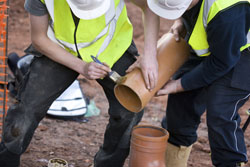Sustainable sanitation for Europe
Most European approaches to sanitation are based on 19th and 20th century methods and systems. Some now consider these insufficiently sustainable, based on energy costs and environmental impact. However, there is no simple replacement for the current systems, suggesting a lack of innovation. According to the EU-funded project 'Brokering environmentally sustainable sanitation for Europe' (BESSE), which ran from June 2009 to May 2012, such innovation would be the outcome of its efforts in knowledge brokerage in the field of sustainable sanitation. During its tenure, BESSE had two main goals: to bridge the gap between science, policymaking and implementation, and to promote inter- and transdisciplinary approaches involving sciences and social studies. BESSE implemented these through programmes intended to identify the current state of the art and knowledge gaps, and to map technology options and actors currently available. The project conducted a series of pilot studies to model under what circumstances knowledge brokerage could accelerate the pace of sanitation innovation. BESSE ran such experiments in Bulgaria, Italy and the Netherlands. The Italian setting was rural and the other two were urban/industrial. Project partners identified four forms of resistance to innovation: technological inertia, community disengagement, institutional immobility and research weakness. The researchers concluded that, combined, these represent a trap for sustainable sanitation. Subsequently, BESSE began a new phase of drawing lessons from these experiments, which would ultimately lead to policy guidelines. The policy guidelines constituted a position paper, containing the project results about knowledge brokerage, and a set of policy guidelines. The resulting 26 recommendations were aimed at various actors, including water companies, civil organisations, researchers and policymakers. These were summarised by BESSE, whose partners also expressed project outcomes as a list of 20 'lessons learnt'. The main documents delivered during the project were collated into a BESSE project resource book, published on the project website(opens in new window) . The project's information was also shared through various awareness raising initiatives.



